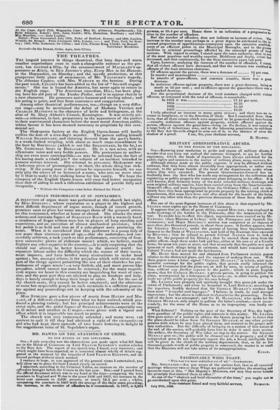MILITARY ADMINISTRATIVE ABUSES.
TO THE EDITOR OF THE SPECTATOR.
SIR—Knowing your resolution to probe and expose all military abuses, I wonder that you have not noticed the extreme disregard, to use no harsher expression, which the heads of departments have always exhibited for the public rights and interests in the matter of military plans, maps, surveys, &c. Although always made at the public expense, it may be affirmed without
rashness, that they have almost invariably been appropriated, or rather con- fiscated, to the private benefit of the bead of the departments under whose orders they were executed. The present Quartermaster-General has us. doubtedly been the first who has made any arrangement for the collection and registering as public property the numerous plans belonging to his office. It is well known, that formerly many of the most valuable military drawings, and even original military repot ts, have been carried away from the Quartermaster. General's uffice, and more frequently from the Ordnance Office; and so COM. pletely have they been appropriated as private property by the retiring chiefs of departments, that some have been sold after death fur the benefit of the heirs, without any other title than the previous abstraction of them from the public offices.
But one of the most flagrant instances of this abuse is that exposed by Mr. LEADER some nights ago in the House of Commons.
It appears that an officer of great ability, named MerciteL, was employed to make drawings of the battles in the Peninsula, after the termination of the war. To enable him to effect this object, negotiations were carried on by Mr. CANNING (then Minister at Li-bon) with the Portuguese and Spanish Go- vernments; and Major MITCHEL'S mission was completed at an expense of more than fire thousand pounds, in about three years. It further appears, that Sir GEORGE Muitaav, under the pretext d having been Quartermaster- General to the Duke of WELLINGTON, laid hold of the drawings thus executed by AIrrettet.; that he refused to permit Colonel NAPIER even to look at them for the purposes of his history; that be carried them away from the public offices—kept them under lock and key, either at his own or at a friend'. home, for some ten years or more, and that so secretly that the public was quite ignorant of such things being in existence, and would have remained so if Colonel NA pit it had not made the fact known.
Mr. Hour. then moved for and obtained from Parliament certain papers relative to the abstracted plans, and the expense of making them out. With these papers came a letter signed " GEORGE Me URA v," in which, with inn- presmiltie contempt for the public rights, that person coolly informed the House of Commons that the plans are, or will he soon, in course of publics. thus, without any further expense to the public ; which in plain English means, that Sir GEORGE MURRAY. a private person, is going to publish the plans, accompanied by a lettei press of his own—or, in other words, going to make use of the public property for his own Woof. Mr. LEADER very properly and spiritedly brought this gross job under the notice of Parliament; and when he broached it, Lord Howicx, according to the reporters, frankly declared that Sir GEORGE aletutaY's conduct had been most " irregular and improper." I believe, in truth, Ile used stronger expressions; but the above is sufficient to characterize the proceeding. Node. nial of the facts was attempted ; and Sir IL HaRDINGE, who spoke for Sir GEORGE Mu RR AY, only sought to palliate the latter's conduet,—most unsuc- cessfully, for the sense of the House as to its impropriety was loudly ex- pressed. What followed ? Nothing on the part of the Secretary of War, the legiti- mate guardian of the public rights and interests in this matter. Mr. LEADER then gave notice of a motion to address the Queen, praying her to direct drat the plans should be taken from Sir GEORGE Mu Real', or any other private persons with whom be may have placed them, and restored to the proper mili- tary authorities. But the difficulty of bringing on a motion of this nature at the end of the session, will probably force hint to defer it until next session. Itle.nwhiie, the Secretary of War takes no step in the matter. Sir GEORGE MURRAY goes on ; the public will be chooser] out of its property ; and if the independent press do not vigorously expose the job, a broad, intelligible hint will be given to the chiefs of the military departments, that, as far as five thousand pounds worth of public property is concerned, the matter is so small that the Ministers will not take notice of its misappropriation.
ELIAS.


























 Previous page
Previous page